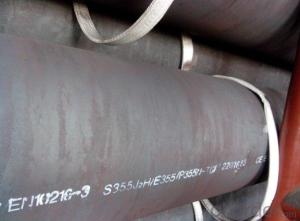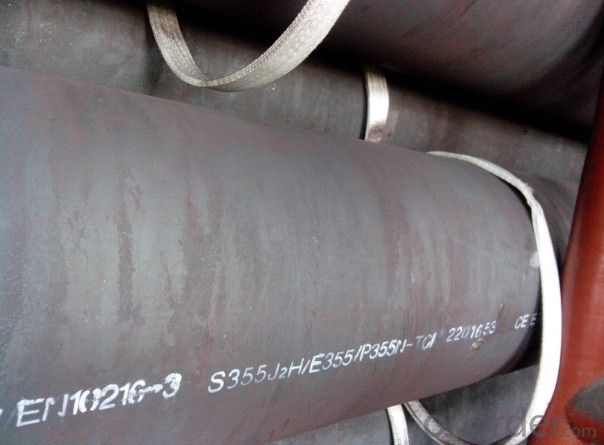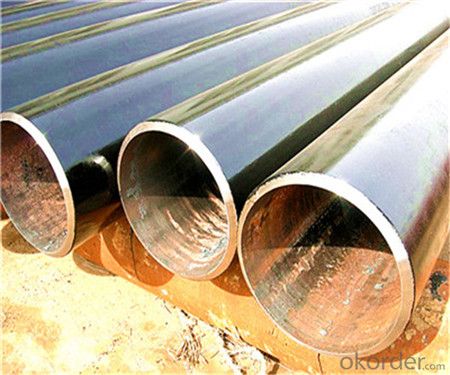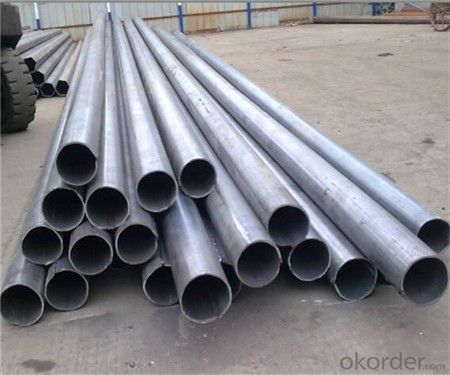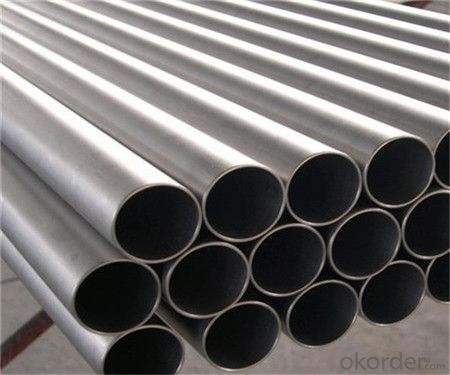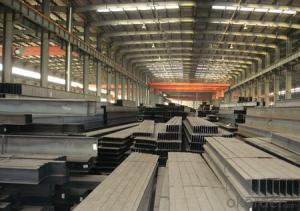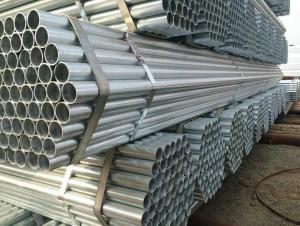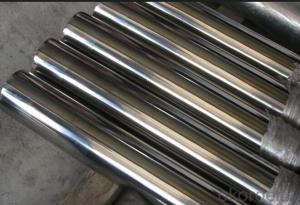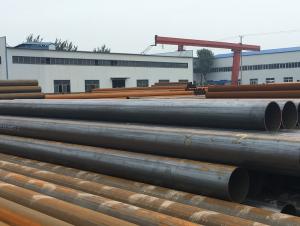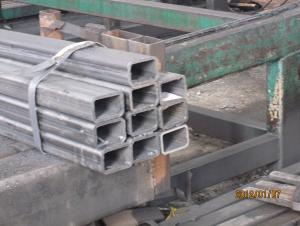Seamless Pipe for Pressure Purpose Manufacturer
- Loading Port:
- China Main Port
- Payment Terms:
- TT or LC
- Min Order Qty:
- 30 m.t.
- Supply Capability:
- 12000 m.t./month
OKorder Service Pledge
OKorder Financial Service
You Might Also Like
1、Standard Specification: EN 10216-1
●Steel grades, Chemical composition and Mechanical properties
Note: a: Quality TR1 Delivery condition: as formed or normalized or normalizing-formed
b: Quality TR2 Delivery condition: as normalized or normalizing-formed
2、Structure of Seamless Pipe EN 10216-1:
Seamless pipe is formed by drawing a solid billet over a piercing rod to create the hollow shell. As the manufacturing process does not include any welding, seamless pipes are perceived to be stronger and more reliable. Historically seamless pipe was regarded as withstanding pressure better than other types, and was often more easily available than welded pipe.
3、Seamless Pipe ASTM EN 10216-1:
Standard | GB, DIN, ASTM ASTM A106-2006, ASTM A53-2007 |
Grade | 10#-45#, 16Mn 10#, 20#, 45#, 16Mn |
Thickness | 8 - 33 mm |
Section Shape | Round |
Outer Diameter | 133 - 219 mm |
Place of Origin | Shandong, China (Mainland) |
Secondary Or Not | Non-secondary |
Application | Hydraulic Pipe |
Technique | Cold Drawn |
Certification | API |
Surface Treatment | factory state or painted black |
Special Pipe | API Pipe |
Alloy Or Not | Non-alloy |
Length | 5-12M |
Outer Diameter | 21.3-610mm |
Grade | 20#, 45#, Q345, API J55, API K55, API L80, API N80, API P110, A53B |
Standard | ASME, ASTM |
4、Packaging & Delivery
Packaging Details: | seaworthy package,bundles wrapped with strong steel strip |
Delivery Detail: | 15-30days after received 30%TT |
5、FAQ of Seamless Pipe EN 10216-1:
①How is the quality of your products?
Our products are manufactured strictly according to national and internaional standard, and we take a test
on every pipe before delivered out. If you want see our quality certifications and all kinds of testing report, please just ask us for it.
Guaranteed: If products’ quality don’t accord to discription as we give or the promise before you place order, we promise 100% refund.
②How about price?
Yes, we are factory and be able to give you lowest price below market one, and we have a policy that “ for saving time and absolutely honest business attitude, we quote as lowest as possible for any customer, and discount can be given according to quantity”,if you like bargain and factory price is not low enough as you think, just don’t waste your time.Please trust the quotation we would give you, it is professional one.
③Why should you chose us?
Chose happens because of quality, then price, We can give you both.Additionally, we can also offer professional products inquiry, products knowledge train(for agents), smooth goods delivery, exellent customer solution proposals.Our service formula: good quality+good price+good service=customer’s trust
SGS test is available, customer inspection before shipping is welcome, third party inspection is no problem.
6、Seamless Pipe EN 10216-1 Images:
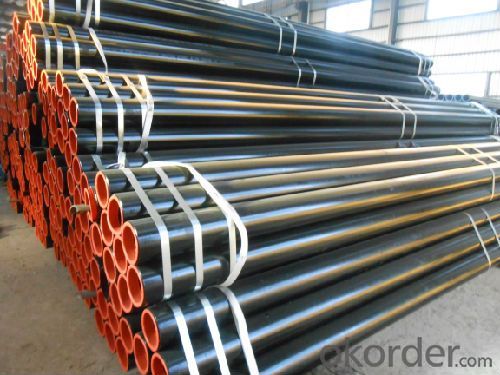
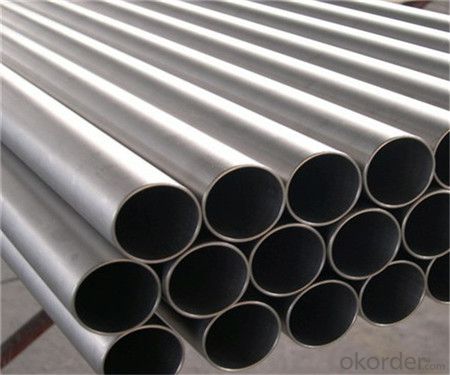
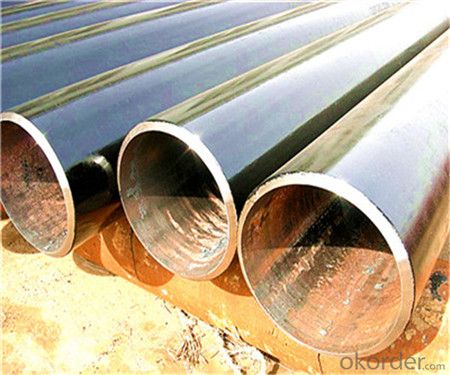
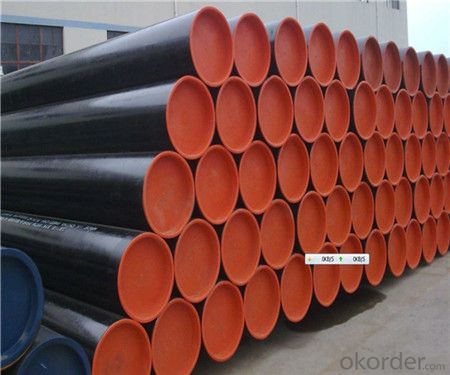
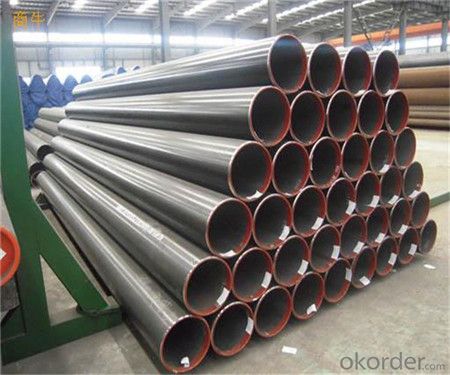
- Q: How do you determine the maximum allowable stress for a steel pipe?
- To determine the maximum allowable stress for a steel pipe, several factors need to be considered. Firstly, the type of steel used in the pipe is crucial as different types of steel have different mechanical properties and strengths. Secondly, the dimensions and thickness of the pipe play a significant role in determining its maximum allowable stress. Thicker pipes generally have higher allowable stresses compared to thinner ones. Additionally, it is important to consider the operating conditions under which the pipe will be subjected. This includes factors such as the temperature, pressure, and the type of fluid flowing through the pipe. These conditions can greatly affect the maximum allowable stress as high temperatures or corrosive fluids may weaken the steel and reduce its strength. To determine the maximum allowable stress, engineers typically refer to industry standards and codes such as the American Society of Mechanical Engineers (ASME) Boiler and Pressure Vessel Code and the American Petroleum Institute (API) standards. These standards provide guidelines and formulas for calculating the maximum allowable stress based on the material properties, dimensions, and operating conditions of the pipe. It is important to note that determining the maximum allowable stress is a critical step in ensuring the structural integrity and safety of the steel pipe. It requires a thorough understanding of the materials, design considerations, and industry standards. Therefore, it is recommended to consult with experienced engineers or professionals who specialize in piping design and analysis to accurately determine the maximum allowable stress for a steel pipe.
- Q: What is the shear strength of steel pipes?
- The shear strength of steel pipes can vary depending on various factors such as the grade and thickness of the steel, as well as the manufacturing process and any additional treatments or coatings applied. In general, steel pipes have a high shear strength due to the inherent strength of steel as a material. The shear strength is typically determined through testing and can range from 50,000 to 80,000 pounds per square inch (PSI) for common grades of steel pipes. However, it is important to note that the shear strength can be significantly higher for specialized or higher-grade steel pipes designed for specific applications such as offshore drilling or high-pressure systems. Therefore, it is advisable to consult the manufacturer's specifications or engineering standards for accurate and specific shear strength values for a particular steel pipe.
- Q: What are the different types of fittings used with steel pipes?
- There are several types of fittings used with steel pipes, including elbow fittings, tee fittings, coupling fittings, union fittings, and flange fittings.
- Q: Can steel pipes be used for underground heat exchange systems?
- Yes, steel pipes can be used for underground heat exchange systems. Steel is a durable and strong material that can withstand the pressure and environmental conditions typically found underground. It is resistant to corrosion and can handle high temperatures, making it suitable for transporting heat efficiently. Additionally, steel pipes are readily available and cost-effective compared to alternative materials, making them a popular choice for underground heat exchange systems. However, it is important to ensure proper insulation and protection of the steel pipes to prevent heat loss and damage from external factors such as moisture or soil movement.
- Q: Can steel pipes be used for aboveground applications?
- Yes, steel pipes can be used for aboveground applications. Steel pipes are known for their strength, durability, and resistance to corrosion, which makes them suitable for various aboveground applications. They are commonly used in industries such as construction, oil and gas, water transportation, and infrastructure development. Steel pipes can be used for aboveground applications such as structural supports, handrails, fencing, scaffolding, outdoor pipelines, and various other outdoor structures. Additionally, steel pipes can be coated or painted to provide further protection against weather conditions and enhance their aesthetic appearance. Overall, steel pipes are a versatile choice for aboveground applications due to their reliability and long-lasting performance.
- Q: What is the difference between steel pipes and cast iron pipes?
- The main difference between steel pipes and cast iron pipes lies in their composition and properties. Steel pipes are made from an alloy of iron and carbon, which gives them high strength and durability. They are also resistant to corrosion and can withstand high pressure and temperature conditions. On the other hand, cast iron pipes are made from molten iron, which provides them with excellent soundproofing capabilities and resistance to fire. However, cast iron pipes are more prone to corrosion and can be brittle, making them less suitable for high-pressure applications.
- Q: How do you measure the thickness of steel pipes?
- To measure the thickness of steel pipes, you can use various methods depending on the level of accuracy required. One commonly used method is the ultrasonic measurement technique. Ultrasonic measurement involves using an ultrasonic thickness gauge, which emits high-frequency sound waves that travel through the pipe walls and bounce back to the gauge. The time it takes for the sound waves to travel through the pipe and return provides an accurate measurement of the thickness. This method is non-destructive and can be used on both ferrous and non-ferrous materials. Another method is the use of calipers or micrometers. This involves manually measuring the outside diameter (OD) and inside diameter (ID) of the pipe and then subtracting the ID from the OD to obtain the thickness. However, this method is less accurate compared to ultrasonic measurement. In some cases, where precision is not critical, a simple tape measure or ruler can be used to measure the outside diameter of the pipe. The thickness can then be estimated by referring to standard pipe thickness charts or tables. It is important to note that measuring the thickness of steel pipes accurately is crucial for various applications such as construction, manufacturing, and engineering. Therefore, it is recommended to use appropriate measuring tools and techniques to ensure accurate results.
- Q: Are steel pipes environmentally friendly?
- Steel pipes can be considered environmentally friendly for several reasons. Firstly, steel is a highly durable and long-lasting material, which means that steel pipes have a longer lifespan compared to other materials like plastic pipes. This reduces the need for frequent replacements and repairs, reducing waste and conserving resources. Secondly, steel is a highly recyclable material. At the end of their lifespan, steel pipes can be easily and efficiently recycled, without losing their properties or quality. This reduces the demand for new steel production, which often requires significant amounts of energy and resources. Furthermore, steel pipes have a high resistance to corrosion, which means that they require fewer chemical treatments to prevent rusting and maintain their structural integrity. This reduces the release of harmful chemicals into the environment and minimizes the impact on ecosystems and human health. It is also worth mentioning that steel pipes are used in various industries, including water supply and wastewater management. Steel pipes are known for their excellent strength and reliability, ensuring the safe and efficient transportation of fluids. This reduces the risk of leaks and spills, preventing contamination of water sources and protecting the environment. However, it is important to note that the production of steel pipes does have some environmental impact. The extraction of raw materials, such as iron ore and coal, requires energy and can contribute to deforestation, habitat destruction, and greenhouse gas emissions. Additionally, the manufacturing process itself generates emissions and waste. Overall, while steel pipes may not be completely free from environmental impact, their durability, recyclability, and resistance to corrosion make them a relatively environmentally friendly choice compared to other materials.
- Q: What are the different methods of lining steel pipes?
- There are several methods of lining steel pipes, each with its own advantages and uses. Some common methods include: 1. Cement Mortar Lining: This involves the application of a layer of cement mortar on the inner surface of the steel pipe. Cement mortar provides excellent corrosion resistance and smoothness to the pipe, reducing friction and improving flow rates. It is commonly used in water supply systems and sewage treatment plants. 2. Polyethylene (PE) Lining: PE lining involves the insertion of a polyethylene tube into the steel pipe. The tube is usually heat fused or mechanically connected to the steel pipe, creating a seamless and corrosion-resistant lining. PE lining is commonly used in gas transmission and distribution pipelines. 3. Epoxy Lining: Epoxy lining involves the application of an epoxy resin to the inner surface of the steel pipe. Epoxy coatings provide excellent resistance to corrosion, abrasion, and chemicals, making them suitable for various applications such as oil and gas pipelines, water treatment, and industrial processes. 4. Trenchless Pipe Lining: This method is used to rehabilitate existing steel pipes without the need for excavation. It involves the insertion of a liner or resin-coated fabric into the existing pipe, which is then inflated and cured to form a new lining. Trenchless pipe lining is commonly used for sewer and water main rehabilitation. 5. Polyurethane (PU) Lining: PU lining involves spraying or pouring a polyurethane coating onto the inner surface of the steel pipe. Polyurethane linings provide excellent resistance to abrasion, impact, and chemicals, making them suitable for applications in mining, slurry pipelines, and wastewater treatment. These are just a few of the many methods available for lining steel pipes. The choice of lining method depends on factors such as the intended application, the environment, and the desired level of corrosion resistance and durability.
- Q: How are steel pipes used in the petrochemical industry?
- Steel pipes are widely used in the petrochemical industry for transporting and distributing various fluids and gases. They are particularly valuable for their durability, strength, and resistance to corrosion, which is crucial when dealing with highly corrosive substances. Steel pipes are employed in various processes such as refining, oil and gas production, chemical manufacturing, and transportation of petrochemical products. Whether it's conveying raw materials, transferring processed products, or supporting infrastructure, steel pipes play a vital role in ensuring the safe and efficient operation of the petrochemical industry.
Send your message to us
Seamless Pipe for Pressure Purpose Manufacturer
- Loading Port:
- China Main Port
- Payment Terms:
- TT or LC
- Min Order Qty:
- 30 m.t.
- Supply Capability:
- 12000 m.t./month
OKorder Service Pledge
OKorder Financial Service
Similar products
Hot products
Hot Searches
Related keywords
